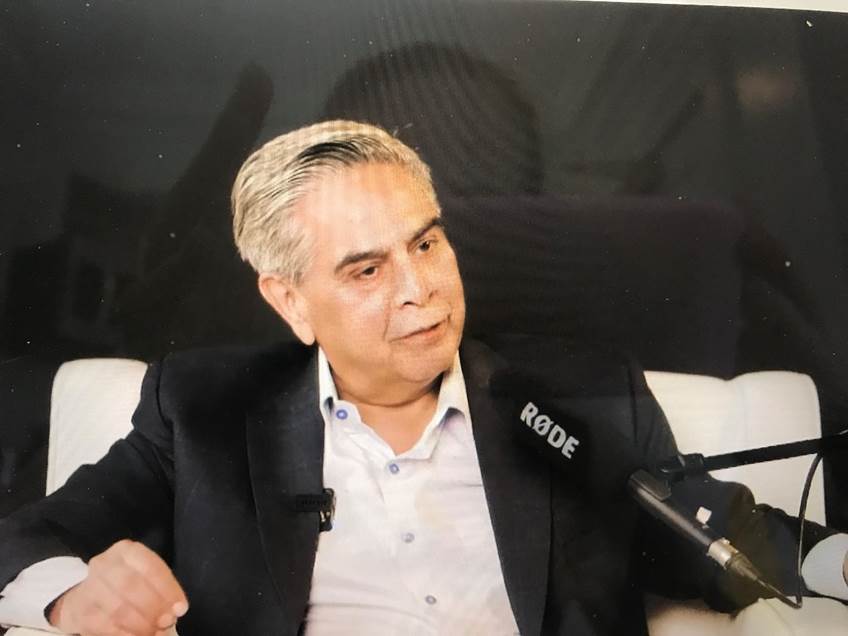
Ali Tauqeer Sheikh

Usama Nizamani
InferTalks Hosts Ali Tauqeer Sheikh on Climate Change
By Elaine Pasquini

Washington: InferTalks host Usama Nizamani discussed important environmental-related issues with leading climate change and development expert Ali Tauqeer Sheikh on his July 21, 2023, program.
Responding to Nizamani’s question on the connection between economic growth and climate change, Sheikh pointed out that many countries are struggling with their economic development due to the losses and damages that come from extreme weather events such as floods and droughts. “The cost of development has increased at such an accelerated rate that institutions like the International Monetary Fund now feel that macroeconomic stability is at stake,” he said. “So, it’s for such reasons that the IMF has now revised its internal processing to look at climate change considerations while dealing with developing countries who need its assistance.”
Sheikh went on to say that since climate change is rapidly accelerating, “no government can do enough, and no countries have enough resources to address the vulnerabilities.” He added, however, that Pakistan “can do a lot more than we have done so far. Where we have not succeeded so far is to closely link environment and development where the climate vulnerability has to be integrated and embedded in economic policies and that has not happened fully as yet.”
One problem is that devastating floods are happening in areas that were fairly safe the last time. “Every disaster teaches us new lessons and highlights another dimension of vulnerability,” he stated.
More work needs to be done by provincial and district local governments because “most vulnerability is at the sub-district level; that’s where we want to see that the infrastructure of our schools and health facilities are climate resilient…and that roads are functional and well-maintained so it can absorb the extra rainwater,” Sheikh recommended.
The climate expert related, however, that improvements in the early warning system helped during the storm two months ago and would be of great assistance in future weather-related disasters. “With information coming from science we have a science-based response coming to it,” he stated. “We need a similar kind of preparedness for all sectors. In our circumstances, our preparedness needs to have the regulations and then ensure their compliance and adherence to those regulations.”
In addition, since Pakistan’s cities are expanding rapidly, new ideas need to be focused on urban planning. “Cities are not supposed to be sprawls,” he insisted. “Cities are measured by the density of their populations which means they need to grow vertically, upward… [people] need to live in apartments.”
“It is cheaper to live in a densely populated city that grows vertically,” he argued, “because people then don’t have to commute for several hours to go to work and back.” If cities grow vertically, he added, they also will not encroach on valuable agricultural lands. Sheikh also stressed the importance of planting trees and grass which reduces the temperature from concrete in urban areas. “This is important for local governments to do,” he stated.
Nizamani pointed out that last year devasting floods forced 33 million people out of their homes who were left to fend for themselves. In addition, more than 1,000 people died in the disaster. All of this was at a financial cost of more than $30 billion to the overall economy.
Pakistan secured around $10 billion in pledges from the international community, Nizamani said, but had not received all of that funding at this time.
With respect to these financial commitments, Sheikh explained that many of those pledges from foreign donor countries were “repackaging of older commitments and were already ongoing projects.” Unfortunately, there was insufficient follow-up communication with the donor countries regarding their pledges. Updating them was Pakistan’s responsibility, he said, “so the confidence of the donor or the development partner is with us.”
In conclusion, Sheikh noted that Pakistan needs to have policies at all levels of government concerning housing and building rules. “These policies are absent, and they are at the heart of resilience,” he said. “A lot of resilience is only common sensical application of what we already know. A lot of climate-related adjustment must be driven by a need to have more resilience, reduce our vulnerability and be based on some science, historical wisdom, and a slow process.”
Any resilience or response to climate change will come through a “conservative democratic process,” Sheikh argued, “whereby the citizens and concerned stakeholders take ownership of what needs to be done.”
Glaciers are melting at a much faster rate; incidents of flooding and drought have increased tremendously; and the frequency and ferocity of calamities of this sort are growing. “The monsoon pattern has not changed,” Sheikh stated. “Monsoon patterns will not go back…it is visiting us sooner; it is visiting us in areas that are not traditionally monsoon areas, and it is coming to us in quantities that we have not seen before.” But, he added, “we have to live with the new normal that has emerged.”
Pakistan needs to demand that the West cut their carbon emissions, Sheikh argued, but… “we need to see what we can do and a lot of that is very common sensical and inescapable. We need to protect our people and the first order of business is for the society and the economy. Once we start doing that with good investments in human capital…Pakistan can do that.”
(Elaine Pasquini is a freelance journalist. Her reports appear in the Washington Report on Middle East Affairs and Nuze.Ink.)
|

